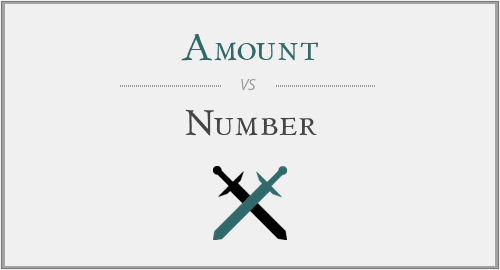Amount" and "number" both refer to quantity and can be used as nouns and verbs as well. Even so, this doesn't mean that they are synonyms or that they can replace each other anytime. In fact, distinct contexts require a certain word from these two, depending on an important factor.
Find out why you cannot replace "amount" with "number" and how to use them correctly.
Amount vs. Number
As verbs, "amount" and "number" have distinct meanings, easy to remember and not creating doubts or confusions. "To amount" means to have a particular total, and "to amount to something" refers to being the same or having the same effect as something. "To number" is usually used in passive, meaning to give something a number, or, secondary, it can also refer to "numbering a particular amount of people/things", which means that there are a lot of people/things.
The actual confusion that is often created between "amount" and "number" is actually sourced by the nouns they represent. And the factor that determines which one you should use is the thing you are trying to determine the quantity for - is it countable or uncountable? "Amount" is used to offer the quantity of uncountable nouns, while "number" illustrates the quantity of countable nouns.
When do we use "amount"?
As already explained above, "amount" is used to determine how much there is of something, when that thing is not countable.
Example: This project requires a huge amount of energy and time. - energy and time are uncountable, so their quantity is expressed using "amount".
When do we use "number"?
Besides its basic meanings as a noun (referring to a group of numbers, as in "phone number", or simply to the symbol used in the counting system, such as "four", "ten" etc.), "number" is used to determine the amount of something that is countable.
Example: Tell me the number of people that entered your building today. - people are countable, which is why "number" is used to determine their quantity.
Conclusion
"Amount" and "number" have multiple and distinct meanings, but when it comes to measuring or determining a quantity, things must be clear and easy to remember - you have to use "amount" when referring to uncountable things, while "number" is perfect to determine how many countable things there are.





Have a discussion about this article with the community:
Report Comment
We're doing our best to make sure our content is useful, accurate and safe.
If by any chance you spot an inappropriate comment while navigating through our website please use this form to let us know, and we'll take care of it shortly.
Attachment
You need to be logged in to favorite.
Log In